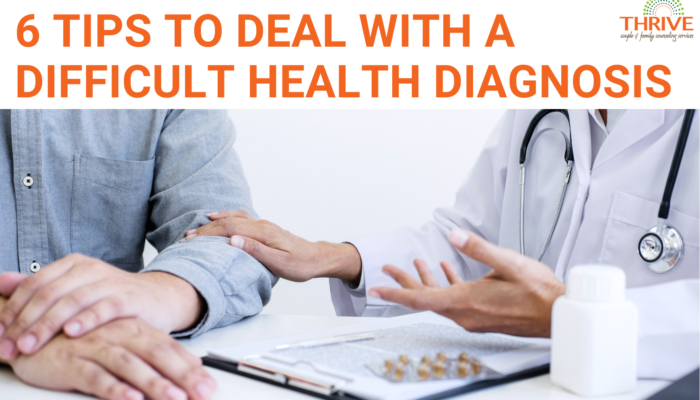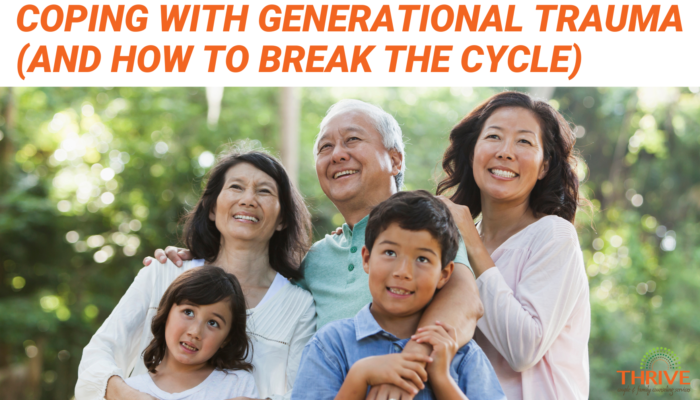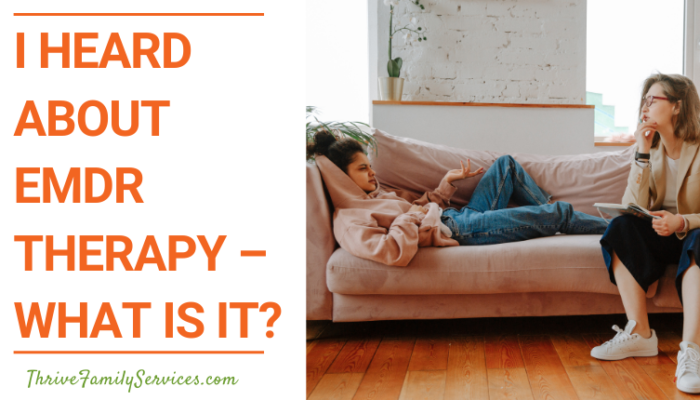Getting an unexpected diagnosis can turn your world upside down. It can feel as though you are in a tailspin considering what this will mean for your overall health going forward, treatment options, costs of treatments and the long-term prognosis. It can be traumatic to face a serious health issue, no matter what age you are.
How you move forward from a difficult diagnosis will impact your recovery, long-term outcomes, and your relationships with friends and family. A difficult diagnosis is often life-changing, and it can be overwhelming to think about. You may fear how this will change your relationships and how your loved ones see you in addition to your concerns about your health.
How can I deal with a difficult diagnosis?
If you’re concerned about how to deal with a difficult health diagnosis, here are 6 tips from an Emotionally Focused Couples Therapist:
Give yourself time after diagnosis
It is important that you give yourself time to absorb the news of your diagnosis. Giving yourself space allows you to work through your emotions about what’s going on. Emotions that may come up after getting distressing news like this can include denial, anger, fear and anxiety.
All these emotions are absolutely normal. If you’re feeling them, that’s okay. Remember though that feelings aren’t facts. Don’t let your fear hold you hostage from seeking to learn more about your diagnosis, your treatment options, and getting the help you need.
Learning to accept the diagnosis can be a turning point
Learning to accept a difficult diagnosis is a process and doesn’t happen all at once. However, when you can come to accept a health challenge, it can be a turning point in your life to finding your new normal.
Acceptance is often a powerful way to lessen the suffering we feel when we’re distressed. Instead of wasting our valuable energy on fighting against reality, acceptance allows you to acknowledge what is and move forward.
Educate yourself on your condition
Learn as much as you can about your condition. You will learn you are not alone and will learn what others have found helpful in the way of effective treatments in the medical world. Search out reputable sources for your information. Start with recommended websites from your doctor. For more in-depth information, see the National Institute of Health, the U.S. National Library of Medicine and any national organizations related to your illness.
Communicate about the diagnosis with your spouse or partner
Talk openly and honestly with the people in your life about your experience. Whether it’s your spouse, partner, a sibling, or close friend, having a support system in your immediate circle is crucial for dealing with a difficult health diagnosis. Dealing with something of this magnitude is too much to do on your own, and you deserve support. Even if you don’t know what to talk about, don’t close yourself off to the people in your life that care about you. This includes sharing your experience, your thoughts and feelings about your fears, and anxiety around your health diagnosis.
Don’t go it alone
Don’t feel like you need to keep your health diagnosis a secret. It is important to have a support network of people you believe can be helpful, not just folks in your immediate circle. So, consider who you trust and want to tell and reach out to those family, friends, and neighbors.
Those who know, will be in a better position to help you. You don’t have to go it alone after a difficult diagnosis. None of us are islands unto ourselves.
Also, don’t be afraid to seek out additional support if needed. It may be necessary to enlist the help of other professionals in order to cope and function at your best. Physical therapists, nurses, massage therapists, occupational therapists, and professional counselors, to name a few, can be a wonderful support system to add to your network of caring individuals.
Take it one day at a time
Stay focused on today, and remember not to look too far into the future. Looking too far ahead can only create doubt and uncertainty.
If you are struggling with grieving the old life you had and coming to terms with the new life you have been handed, please reach out. There is hope for a better tomorrow with love and acceptance. We can all find joy in the little acts of kindness that come our way.
One reason why it can be hard to focus on the present is that we worry that it can’t last. Sociologist and researcher Brené Brown says, “When we lose our tolerance for vulnerability, joy becomes foreboding.”
We are scared to soften into joy because we are afraid it will be taken away from us. We dress-rehearse tragedy in an effort to beat vulnerability to the punch. Instead, all we do is keep ourselves from experiencing joy in lieu of trying to prepare ourselves for the worst. Don’t let yourself fall into this trap. It’s possible to enjoy the present moment even if we fear that any joy we feel will be taken away. Remember, the only moment you have control over is the present one. How will you spend it?
How can partners can help a loved one dealing with a difficult diagnosis?
Partners can make a huge difference in the aftermath of a difficult health diagnosis. When you educate yourself on your loved one’s diagnosis, you learn that there is a reason for what you are experiencing with your partner. Perhaps they are more easily triggered, anxious, or irritable post-diagnosis. No matter how they’re feeling, you as a partner have tremendous power to make a difference.
You will also have your own feelings to work through about your loved one’s diagnosis. You may feel fear for your partner’s health, sadness over the changes to your relationship or future plans, loss of the relationship as you knew it, and anxiety over unknowns, or something else entirely. Whatever you feel, it’s okay. Some people think you should deal with your own feelings in order not to burden your partner when they may be going through a lot.
However, we have a saying in Emotionally Focused Therapy that “unprocessed feelings always tweak behavior.”
By attempting to carry your own feelings by yourself, you could unknowingly create negative cycles of interaction, build up resentment, and create a wedge in the time when you need each other the most.
John Bowlby, psychologist and developer of attachment theory, theorized that the development of emotional bonds is a necessary survival mechanism. Basically, Bowlby felt that a constant and reliable source of love and support was crucial to the existence and success of human beings.
A Canadian researcher named Mary Ainsworth, Bowlby’s assistant and colleague, devised a breakthrough study, codifying behaviors that she and Bowlby saw as essential to healthy attachment.
- We must monitor and maintain physical closeness with our loved one(s) and caregiver(s).
- We reach out to our loved one(s) and caregiver(s) when we are upset.
- We miss our loved one(s) and caregiver(s) when we are apart.
Here are some ways to help your loved one after a difficult health diagnosis:
- Practice active listening. Focus on what you hear your partner say.
- Don’t assume you know how your partner is feeling or what they might think.
- Describe your own feelings rather than blaming your partner.
- Be specific and clear. Make requests rather than blaming.
- Avoid criticism, name calling or insults.
- Do take care of yourself. If you are feeling angry or frustrated, take a deep breath or go for a walk.
- Take time to consider what you want to say instead of rushing a conversation.
- Consider timing for conversations.
- Don’t interrupt.
- Avoid bringing up too many topics at once.
- Work together to talk about treatment options.
- Do talk about other things besides the diagnosis.
- Talk about healthy ways to cope with stress.
- Talk openly and honestly about your feelings. Hiding our feelings creates distance. Being vulnerable about how you feel can bring you closer to your loved one.
- Do find ways to laugh. Humor helps.
If you or a loved one is struggling with a new difficult health diagnosis, don’t be afraid to reach out for professional help. Working with a counselor can help you work through your emotions and find freedom from fear.


 Hello, I’m Susan Rexroth, Licensed Professional Counselor. I’m a couple and individual therapist focusing on relationships, trauma, and addictions.
Hello, I’m Susan Rexroth, Licensed Professional Counselor. I’m a couple and individual therapist focusing on relationships, trauma, and addictions.

